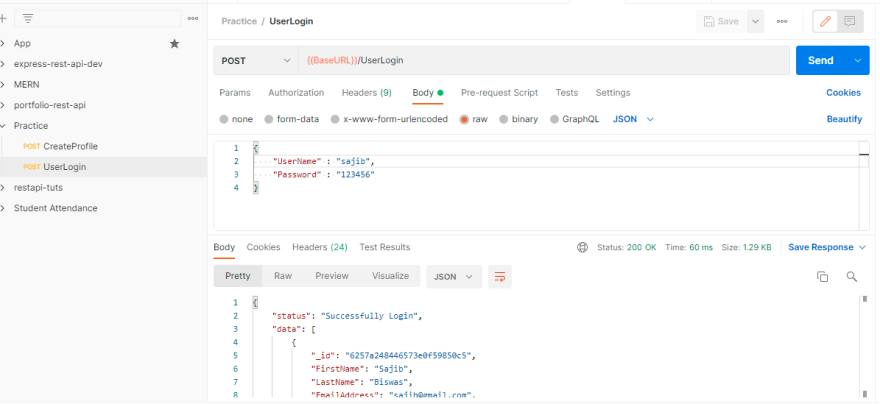Objective: In this article, you will know mongoose model, how to create user using node, router.
Pre-requisite Prior to completing this article, you should have already installed all pre-requisite tooling including: Visual Studio Code, Node Package Manager (NPM), Node, Postman, Mongo Compass.
Create a Model (ProfileModel.js)
const mongoose = require('mongoose')
const DataSchema = mongoose.Schema({
FirstName : {type: String},
LastName : {type: String},
EmailAddress : {type: String},
MobileNumber : {type: String},
City : {type: String},
UserName : {type: String},
Password : {type: String}
});
const ProfileModel = mongoose.model('Profile', DataSchema)
module.exports = ProfileModel;
Create a Controller (ProfileController.js)
At first import ProfileModel. Declare a variable reqBody to store body data. Then create user using ProfileModel model
const ProfileModel = require("../models/ProfileModel");
exports.CreateProfile = (req, res) => {
let reqBody = req.body;
ProfileModel.create(reqBody, (err, data) => {
if(err){
res.status(400).json({status: "Failed to user create", data: err})
}else{
res.status(200).json({status: "Successfully user created", data: data})
}
})
}
exports.UserLogin = (req, res) => {
let UserName = req.body['UserName'];
let Password = req.body['Password'];
// res.status(200).json({status: "Success", data: Password})
ProfileModel.find({UserName, Password}, (err, data) => {
if(err){
res.status(400).json({status: "Failed to login", data: err})
}else{
if(data.length > 0){
res.status(200).json({status: "Successfully Login", data: data})
}else{
res.status(401).json({status: "Unauthorized"})
}
}
})
}
The find() function is used to find particular data from the MongoDB database
Default configuration (app.js)
// Basic import
const express = require('express');
const router = require('./src/routes/api')
const app = new express();
const bodyParser = require('body-parser')
// Database lib import
const mongoose = require('mongoose')
// Body parser implement
app.use(bodyParser.json())
// MongoDB database connection
let uri = 'mongodb://127.0.0.1:27017/PracticeDB'
let options = {user: '', pass: ''}
mongoose.connect(uri, options, (err) => {
if(err){
console.log(err)
}else{
console.log('Database Connection Success')
}
})
// Routing Implement
app.use('/api/v1', router)
// Undefined Route Implement
app.use("*", (req, res) => {
res.status(404).json({status: "Failed", data: "Not Found"})
})
module.exports = app;
Routes configuration (api.js)
const express = require('express');
const ProfileController = require('../controller/ProfileController')
const router = express.Router();
router.post('/CreateProfile', ProfileController.CreateProfile)
router.post('/UserLogin', ProfileController.UserLogin)
module.exports = router;
Index file (index.js)
const app = require('./app')
app.listen(5000, function(){
console.log('Server run at @5000 port')
})
Now open the Postman and configure few thing like

Then login a user giving basic information and click Send Button

If giving wrong information then showing Unauthorized

Thanks for reading. Happy journey.


Top comments (0)